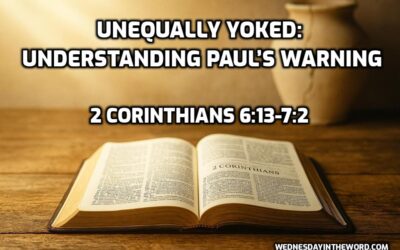Paul’s closing charge is often misunderstood. In this passage, “examine yourself” is not a call to anxious introspection but a corrective to a church testing Paul while overlooking the evidence of Christ at work among them. Paul redirects attention from his credentials to their shared life in Christ, using his authority to build them up and aiming for restoration, unity, and peace.
16 Thorn in the Flesh: How to Embrace Weakness (2 Corinthians 11)
What was Paul’s thorn in the flesh and why didn’t God remove it? Discover how weakness can reveal God’s power and reframe your own struggles.
14 How To Confront With the Meekness of Christ (2 Corinthians 10)
Explore the Meekness of Christ in 2 Corinthians 10. Paul confronts false claims with truth and God’s power, using authority that builds.
13 Cheerful Giver: How to Sow for a Lasting Harvest (2 Corinthians 8-9)
Explore why Paul calls us to be a Cheerful Giver, how generosity reveals faith, heals division, and reflects God’s grace in 2 Corinthians 8–9.
12 Why Gentiles Gave to Jerusalem (2 Corinthians 8-9 Background)
Paul devoted more than a decade of his ministry to the Jerusalem Collection. Understanding the story behind it helps us understand 2 Corinthians 8-9. Today we’ll explore the origin, purpose, and implications of the Jerusalem Collection, using events in Acts and Galatians to trace the evolving relationship between Paul, the Jerusalem apostles, and the Gentile churches.
11 Godly Grief and Worldly Sorrow (2 Corinthians 7:2-16)
Learn how godly grief leads to true repentance, and what it teaches us about confronting others with love and truth.
10 Unequally Yoked: Understanding Paul’s Warning (2 Corinthians 6:13-7:2)
“Do not be unequally yoked” is not a blanket ban on contact with unbelievers. It is a warning about binding yourself in partnerships that tug your heart away from Christ and deceiving nonbelievers into thinking they are on the right path.
09 Receiving Grace in Vain (2 Corinthians 6:1-12)
In 2 Corinthians 6:1–12, Paul urges his readers not to receive the grace of God in vain. Though many in Corinth claimed to believe the gospel, their rejection of Paul revealed a lack of faith. In this episode, Krisan Marotta explains why responding to grace involves more than religious affiliation or claims of belief.
08 New Creation in Christ (2 Corinthians 5:12-21)
In this episode of Wednesday in the Word, Krisan Marotta examines how the Apostle Paul defends his ministry against critics who judge him by outward appearance rather than by the message he proclaims. Paul insists that true transformation comes from God’s work in the heart, not from impressive credentials or presentation. Through this passage, Paul calls the Corinthians—and us—to see others through the lens of the gospel, not worldly standards.
07 Why We Should Not Fear Death (2 Corinthians 5:1-11)
In 2 Corinthians 5:1–11, Paul continues his defense of his ministry by explaining how his confidence in the resurrection shapes his message, motivates his courage, and defines his integrity.
06 Why Paul Did Not Lose Heart and What We Can Learn From Him (2 Corinthians 4)
Paul offers a powerful defense of his ministry, explaining how the gospel he proclaims is not about him, but about the transforming power of God. Though Paul faces rejection, suffering, and accusations, he remains unwavering because he knows the source of the message and the One who is truly at work through it.
05 Why Paul’s Ministry Outshines Moses (2 Corinthians 3:7-18)
In this episode of Wednesday in the Word, Krisan Marotta explores Paul’s bold claim that his ministry as an apostle is more glorious than the ministry of Moses. By comparing the Old and New Covenants, Paul shows that spiritual transformation doesn’t come from the Law but from the work of the Holy Spirit.












